Lecture 22 Topic 22 . . The

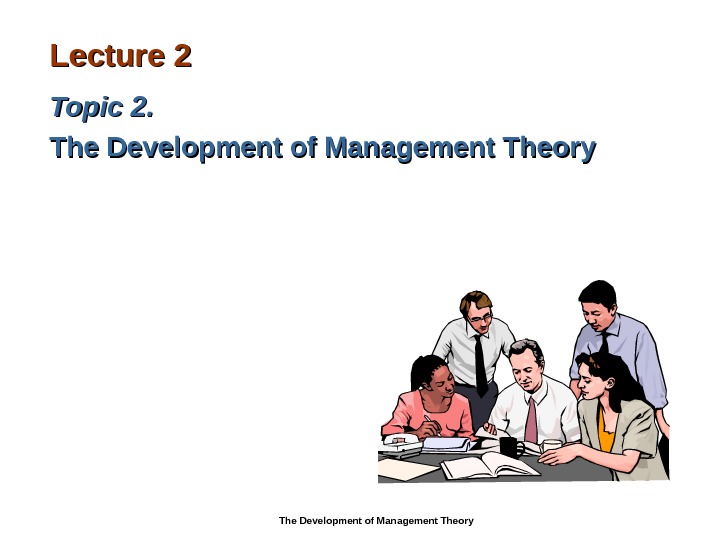
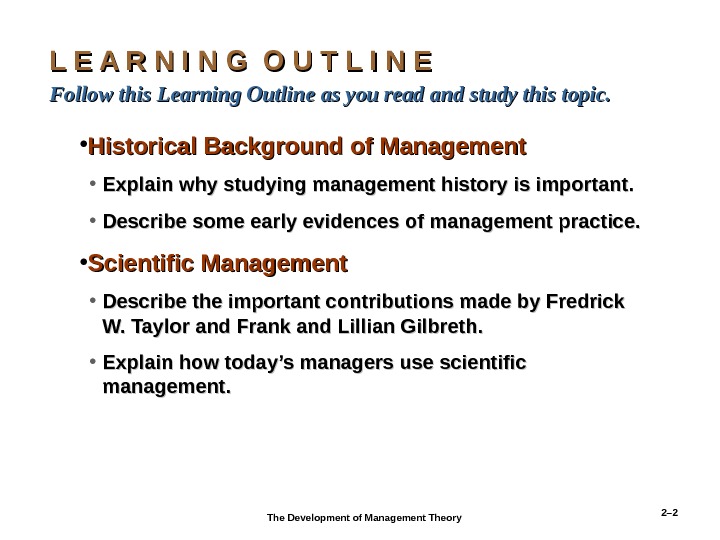
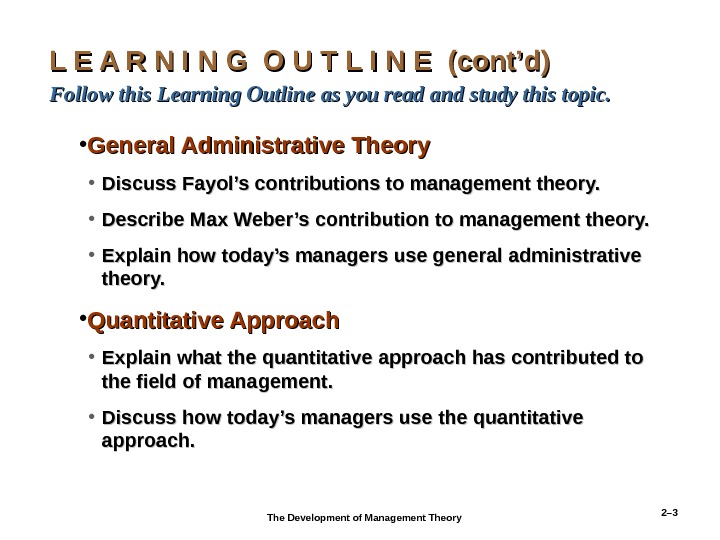
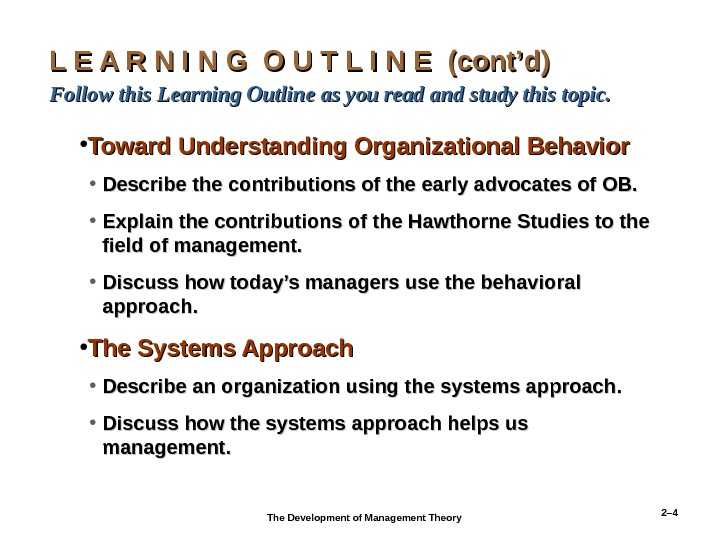
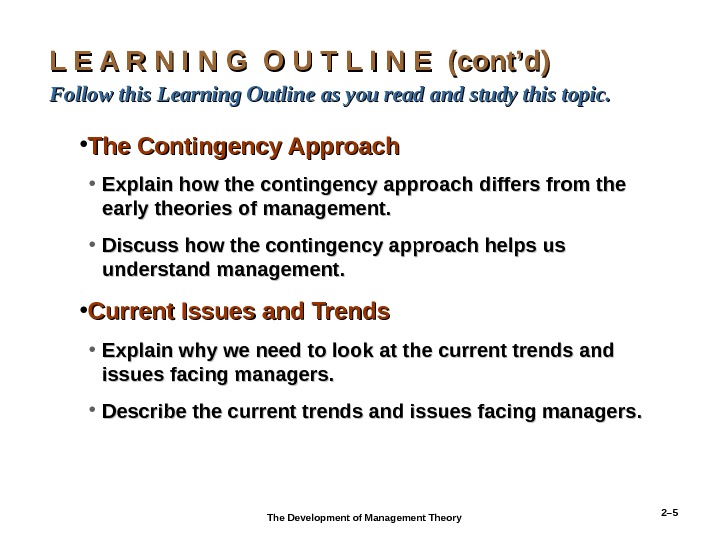
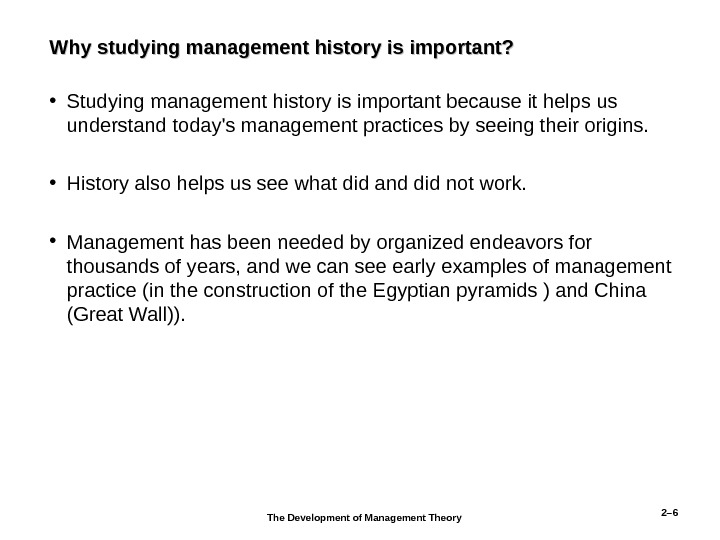
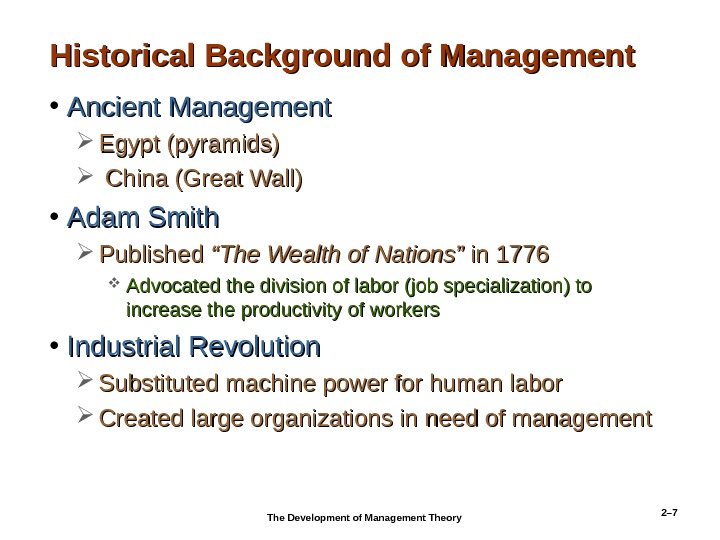
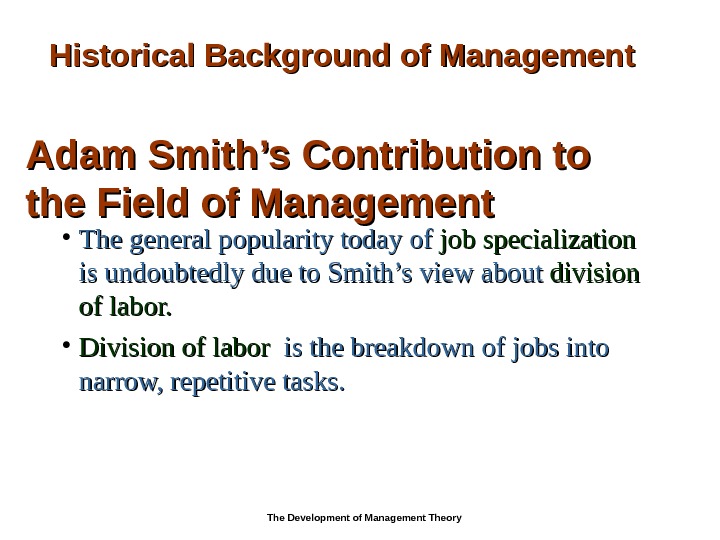
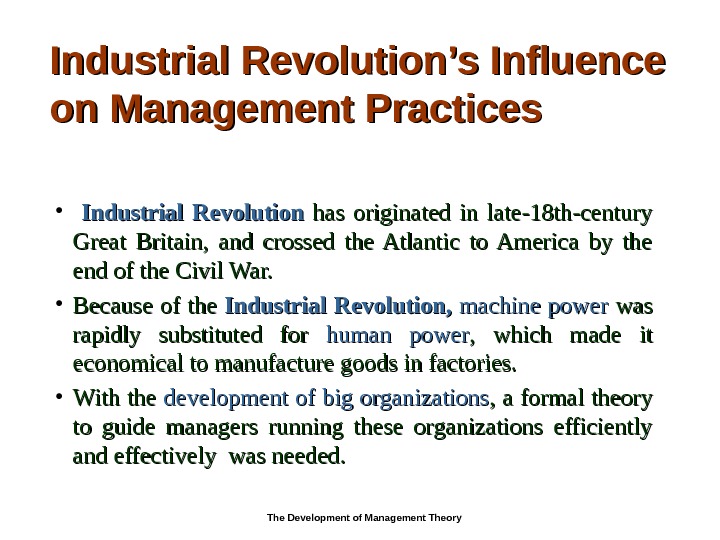

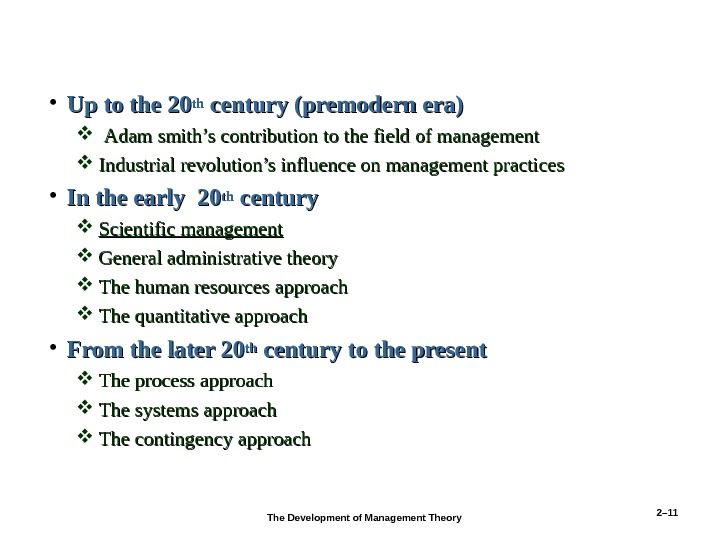
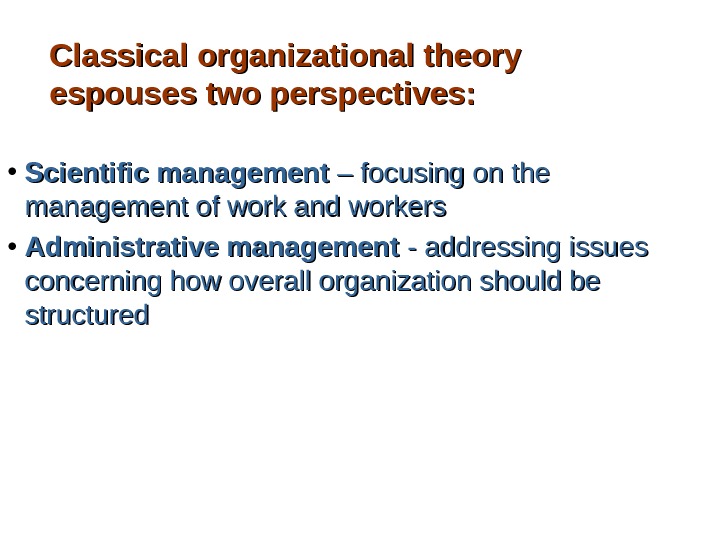

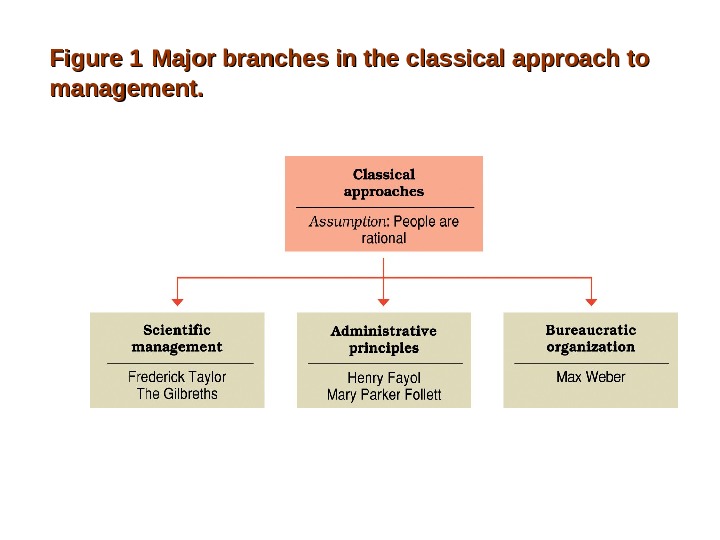
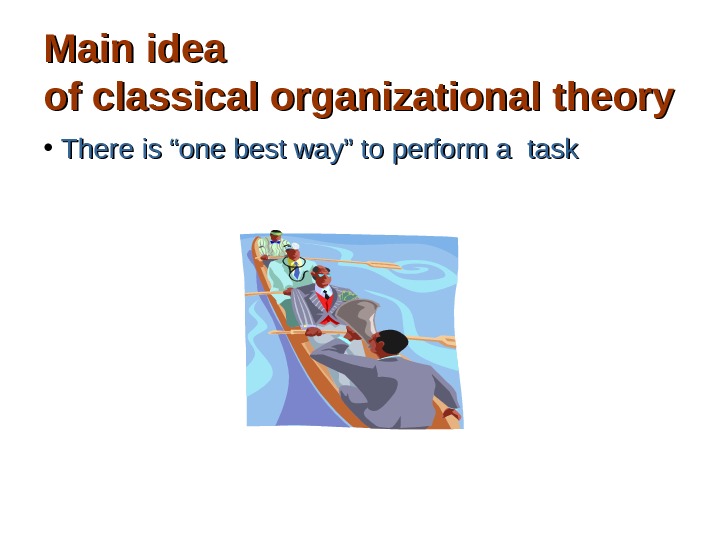
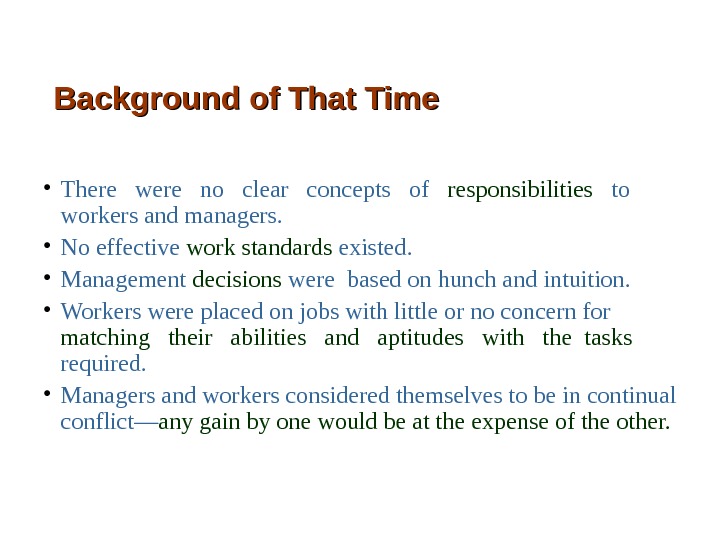
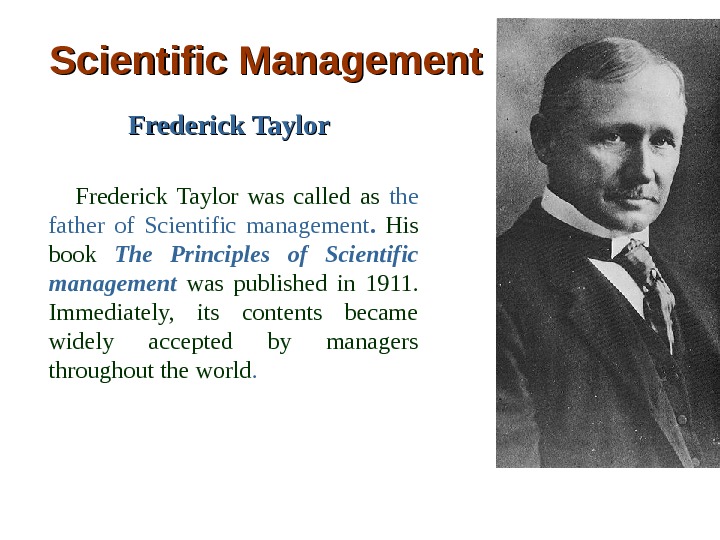
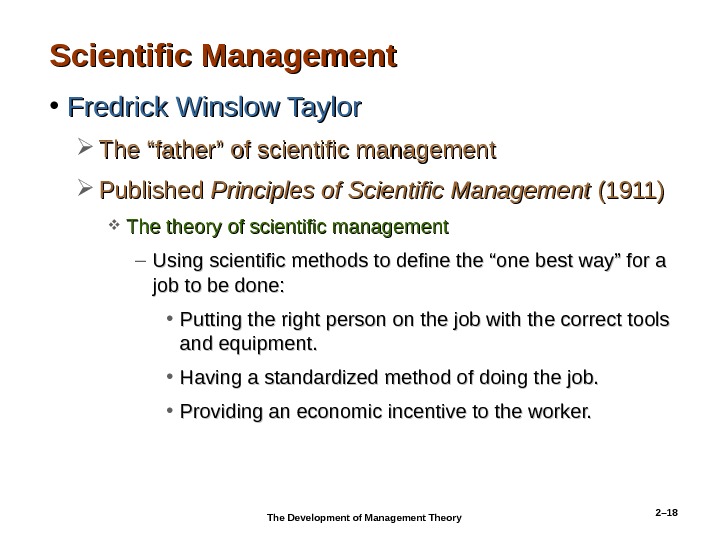
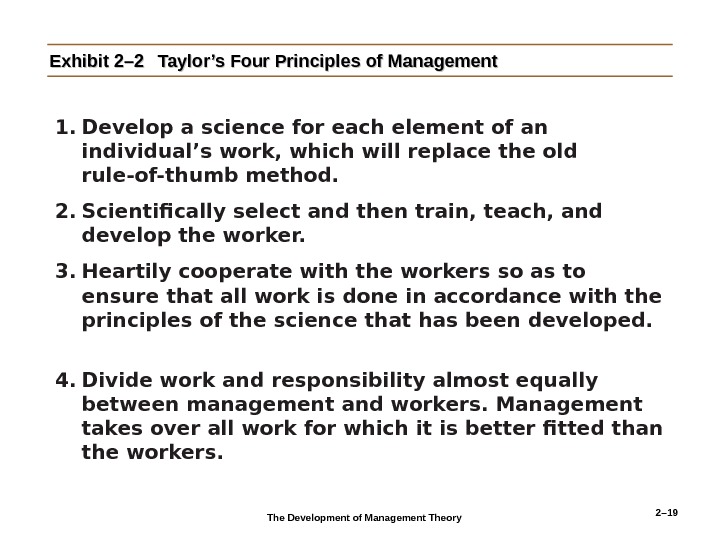
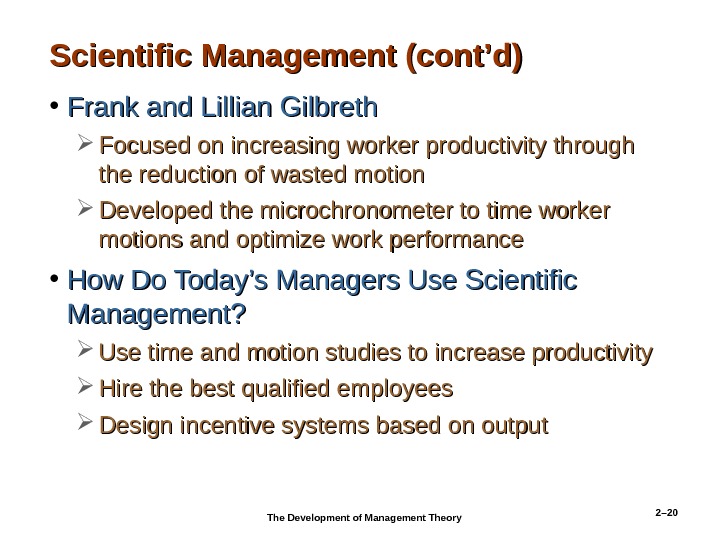

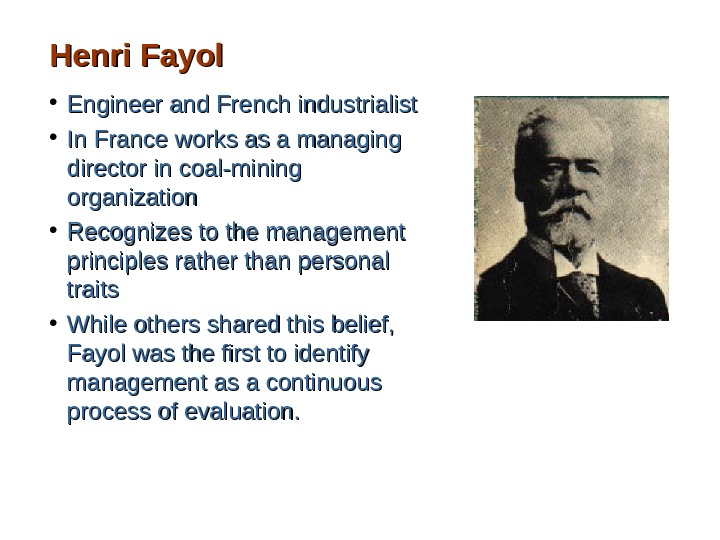
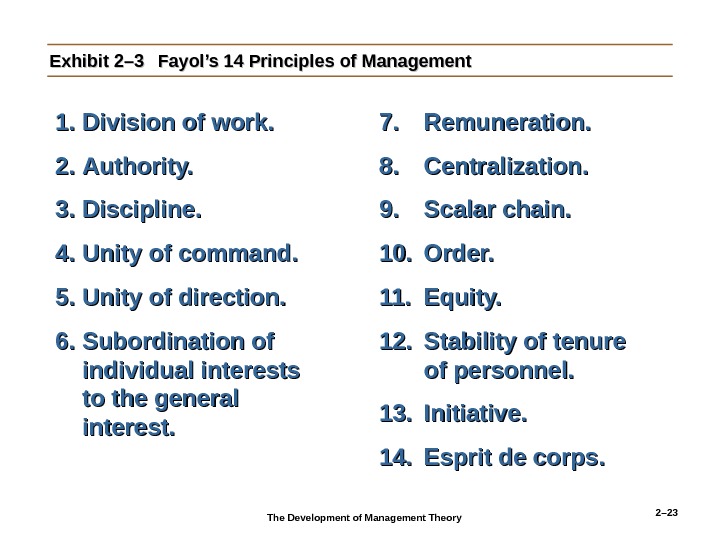
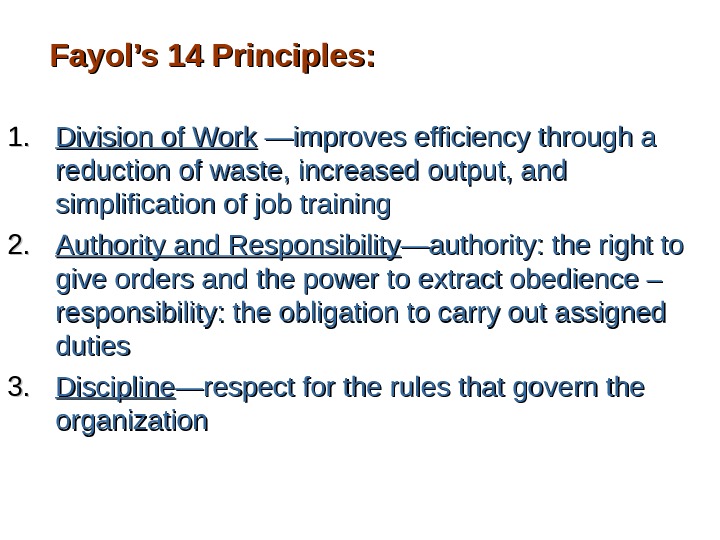
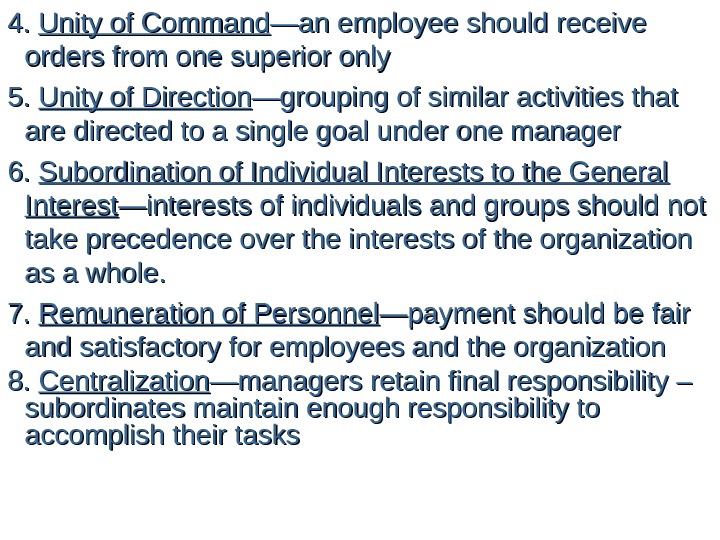
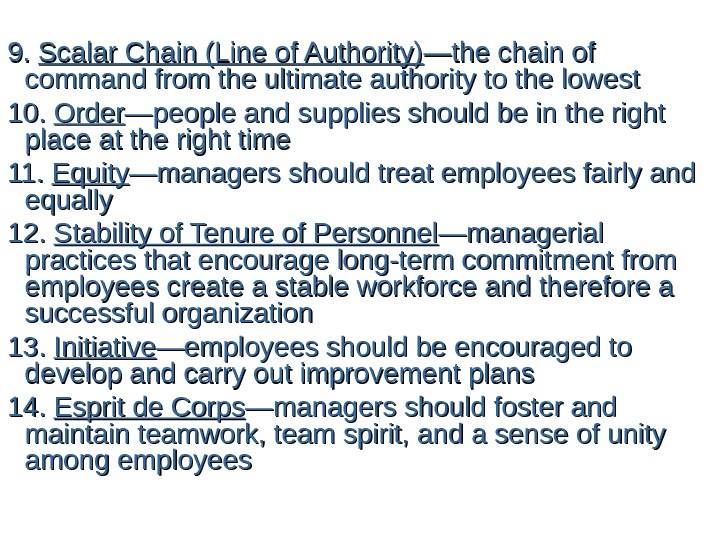
- Размер: 1.3 Mегабайта
- Количество слайдов: 26
Описание презентации Lecture 22 Topic 22 . . The по слайдам
 Lecture 22 Topic 22. . The Development of Management Theory
Lecture 22 Topic 22. . The Development of Management Theory
 2– 2 L E A R N I N G O U T L I N E Follow this Learning Outline as you read and study this topic. • Historical Background of Management • Explain why studying management history is important. • Describe some early evidences of management practice. • Scientific Management • Describe the important contributions made by Fredrick W. Taylor and Frank and Lillian Gilbreth. • Explain how today’s managers use scientific management. The Development of Management Theory
2– 2 L E A R N I N G O U T L I N E Follow this Learning Outline as you read and study this topic. • Historical Background of Management • Explain why studying management history is important. • Describe some early evidences of management practice. • Scientific Management • Describe the important contributions made by Fredrick W. Taylor and Frank and Lillian Gilbreth. • Explain how today’s managers use scientific management. The Development of Management Theory
 2– 3 L E A R N I N G O U T L I N E (cont’d) Follow this Learning Outline as you read and study this topic. • General Administrative Theory • Discuss Fayol’s contributions to management theory. • Describe Max Weber’s contribution to management theory. • Explain how today’s managers use general administrative theory. • Quantitative Approach • Explain what the quantitative approach has contributed to the field of management. • Discuss how today’s managers use the quantitative approach. The Development of Management Theory
2– 3 L E A R N I N G O U T L I N E (cont’d) Follow this Learning Outline as you read and study this topic. • General Administrative Theory • Discuss Fayol’s contributions to management theory. • Describe Max Weber’s contribution to management theory. • Explain how today’s managers use general administrative theory. • Quantitative Approach • Explain what the quantitative approach has contributed to the field of management. • Discuss how today’s managers use the quantitative approach. The Development of Management Theory
 2– 4 L E A R N I N G O U T L I N E (cont’d) Follow this Learning Outline as you read and study this topic. • Toward Understanding Organizational Behavior • Describe the contributions of the early advocates of OB. • Explain the contributions of the Hawthorne Studies to the field of management. • Discuss how today’s managers use the behavioral approach. • The Systems Approach • Describe an organization using the systems approach. • Discuss how the systems approach helps us management. The Development of Management Theory
2– 4 L E A R N I N G O U T L I N E (cont’d) Follow this Learning Outline as you read and study this topic. • Toward Understanding Organizational Behavior • Describe the contributions of the early advocates of OB. • Explain the contributions of the Hawthorne Studies to the field of management. • Discuss how today’s managers use the behavioral approach. • The Systems Approach • Describe an organization using the systems approach. • Discuss how the systems approach helps us management. The Development of Management Theory
 2– 5 L E A R N I N G O U T L I N E (cont’d) Follow this Learning Outline as you read and study this topic. • The Contingency Approach • Explain how the contingency approach differs from the early theories of management. • Discuss how the contingency approach helps us understand management. • Current Issues and Trends • Explain why we need to look at the current trends and issues facing managers. • Describe the current trends and issues facing managers. The Development of Management Theory
2– 5 L E A R N I N G O U T L I N E (cont’d) Follow this Learning Outline as you read and study this topic. • The Contingency Approach • Explain how the contingency approach differs from the early theories of management. • Discuss how the contingency approach helps us understand management. • Current Issues and Trends • Explain why we need to look at the current trends and issues facing managers. • Describe the current trends and issues facing managers. The Development of Management Theory
 Why studying management history is important? • Studying management history is important because it helps us understand today’s management practices by seeing their origins. • History also helps us see what did and did not work. • Management has been needed by organized endeavors for thousands of years, and we can see early examples of management practice ( in the construction of the Egyptian pyramids ) and China (Great Wall) ). 2– 6 The Development of Management Theory
Why studying management history is important? • Studying management history is important because it helps us understand today’s management practices by seeing their origins. • History also helps us see what did and did not work. • Management has been needed by organized endeavors for thousands of years, and we can see early examples of management practice ( in the construction of the Egyptian pyramids ) and China (Great Wall) ). 2– 6 The Development of Management Theory
 2– 7 Historical Background of Management • Ancient Management Egypt (pyramids) China (Great Wall) • Adam Smith Published “The Wealth of Nations” in 1776 Advocated the division of labor (job specialization) to increase the productivity of workers • Industrial Revolution Substituted machine power for human labor Created large organizations in need of management The Development of Management Theory
2– 7 Historical Background of Management • Ancient Management Egypt (pyramids) China (Great Wall) • Adam Smith Published “The Wealth of Nations” in 1776 Advocated the division of labor (job specialization) to increase the productivity of workers • Industrial Revolution Substituted machine power for human labor Created large organizations in need of management The Development of Management Theory
 Adam Smith’s Contribution to the Field of Management • The general popularity today of job specialization is undoubtedly due to Smith’s view about division of labor. • Division of labor is the breakdown of jobs into narrow, repetitive tasks. Historical Background of Management The Development of Management Theory
Adam Smith’s Contribution to the Field of Management • The general popularity today of job specialization is undoubtedly due to Smith’s view about division of labor. • Division of labor is the breakdown of jobs into narrow, repetitive tasks. Historical Background of Management The Development of Management Theory
 Industrial Revolution’s Influence on Management Practices • Industrial Revolution has originated in late-18 th-century Great Britain, and crossed the Atlantic to America by the end of the Civil War. • Because of thethe Industrial Revolution, machine power was rapidly substituted for human power , which made it economical to manufacture goods in factories. • With the development of big organizations , a formal theory to guide managers running these organizations efficiently and effectively was needed. The Development of Management Theory
Industrial Revolution’s Influence on Management Practices • Industrial Revolution has originated in late-18 th-century Great Britain, and crossed the Atlantic to America by the end of the Civil War. • Because of thethe Industrial Revolution, machine power was rapidly substituted for human power , which made it economical to manufacture goods in factories. • With the development of big organizations , a formal theory to guide managers running these organizations efficiently and effectively was needed. The Development of Management Theory
 2– 10 Exhibit 2– 1 Development of Major Management Theories The Development of Management Theory
2– 10 Exhibit 2– 1 Development of Major Management Theories The Development of Management Theory
 • Up to the 20 thth century (premodern era) Adam smith’s contribution to the field of management Industrial revolution’s influence on management practices • In the early 20 thth century Scientific management General administrative theory The human resources approach The quantitative approach • From the later 20 thth century to the present The process approach The systems approach The contingency approach 2– 11 The Development of Management Theory
• Up to the 20 thth century (premodern era) Adam smith’s contribution to the field of management Industrial revolution’s influence on management practices • In the early 20 thth century Scientific management General administrative theory The human resources approach The quantitative approach • From the later 20 thth century to the present The process approach The systems approach The contingency approach 2– 11 The Development of Management Theory
 Classical organizational theory espouses two perspectives: • Scientific management – focusing on the management of work and workers • Administrative management — addressing issues concerning how overall organization should be structured
Classical organizational theory espouses two perspectives: • Scientific management – focusing on the management of work and workers • Administrative management — addressing issues concerning how overall organization should be structured
 Major contributors to the Classical Organizational Theory: Scientific Management: • Frederick Taylor Administrative Management: • Henri Fayol • Max Weber
Major contributors to the Classical Organizational Theory: Scientific Management: • Frederick Taylor Administrative Management: • Henri Fayol • Max Weber
 Figure 1 Major branches in the classical approach to management.
Figure 1 Major branches in the classical approach to management.
 Main idea of classical organizational theory • There is “one best way” to perform a task
Main idea of classical organizational theory • There is “one best way” to perform a task
 Background of That Time • There were no clear concepts of responsibilities to workers and managers. • No effective work standards existed. • Management decisions were based on hunch and intuition. • Workers were placed on jobs with little or no concern for matching their abilities and aptitudes with the tasks required. • Managers and workers considered themselves to be in continual conflict— any gain by one would be at the expense of the other.
Background of That Time • There were no clear concepts of responsibilities to workers and managers. • No effective work standards existed. • Management decisions were based on hunch and intuition. • Workers were placed on jobs with little or no concern for matching their abilities and aptitudes with the tasks required. • Managers and workers considered themselves to be in continual conflict— any gain by one would be at the expense of the other.
 Scientific Management Frederick Taylor Frederick Taylor was called as the father of Scientific management. His book The Principles of Scientific management was published in 1911. Immediately, its contents became widely accepted by managers throughout the world.
Scientific Management Frederick Taylor Frederick Taylor was called as the father of Scientific management. His book The Principles of Scientific management was published in 1911. Immediately, its contents became widely accepted by managers throughout the world.
 2– 18 Scientific Management • Fredrick Winslow Taylor The “father” of scientific management Published Principles of Scientific Management (1911) The theory of scientific management – Using scientific methods to define the “one best way” for a job to be done: • Putting the right person on the job with the correct tools and equipment. • Having a standardized method of doing the job. • Providing an economic incentive to the worker. The Development of Management Theory
2– 18 Scientific Management • Fredrick Winslow Taylor The “father” of scientific management Published Principles of Scientific Management (1911) The theory of scientific management – Using scientific methods to define the “one best way” for a job to be done: • Putting the right person on the job with the correct tools and equipment. • Having a standardized method of doing the job. • Providing an economic incentive to the worker. The Development of Management Theory
 2– 19 Exhibit 2– 2 Taylor’s Four Principles of Management 1. Develop a science for each element of an individual’s work, which will replace the old rule-of-thumb method. 2. Scientifically select and then train, teach, and develop the worker. 3. Heartily cooperate with the workers so as to ensure that all work is done in accordance with the principles of the science that has been developed. 4. Divide work and responsibility almost equally between management and workers. Management takes over all work for which it is better fitted than the workers. The Development of Management Theory
2– 19 Exhibit 2– 2 Taylor’s Four Principles of Management 1. Develop a science for each element of an individual’s work, which will replace the old rule-of-thumb method. 2. Scientifically select and then train, teach, and develop the worker. 3. Heartily cooperate with the workers so as to ensure that all work is done in accordance with the principles of the science that has been developed. 4. Divide work and responsibility almost equally between management and workers. Management takes over all work for which it is better fitted than the workers. The Development of Management Theory
 2– 20 Scientific Management (cont’d) • Frank and Lillian Gilbreth Focused on increasing worker productivity through the reduction of wasted motion Developed the microchronometer to time worker motions and optimize work performance • How Do Today’s Managers Use Scientific Management? Use time and motion studies to increase productivity Hire the best qualified employees Design incentive systems based on output The Development of Management Theory
2– 20 Scientific Management (cont’d) • Frank and Lillian Gilbreth Focused on increasing worker productivity through the reduction of wasted motion Developed the microchronometer to time worker motions and optimize work performance • How Do Today’s Managers Use Scientific Management? Use time and motion studies to increase productivity Hire the best qualified employees Design incentive systems based on output The Development of Management Theory
 General Administrative Theory • Herial Fayol’s contributions He argued that management was an activity common to all human undertakings in business, in government, and even in the home. He stated 14 principles of management —fundamental or universal truths.
General Administrative Theory • Herial Fayol’s contributions He argued that management was an activity common to all human undertakings in business, in government, and even in the home. He stated 14 principles of management —fundamental or universal truths.
 Henri Fayol • Engineer and French industrialist • In France works as a managing director in coal-mining organization • Recognizes to the management principles rather than personal traits • While others shared this belief, Fayol was the first to identify management as a continuous process of evaluation.
Henri Fayol • Engineer and French industrialist • In France works as a managing director in coal-mining organization • Recognizes to the management principles rather than personal traits • While others shared this belief, Fayol was the first to identify management as a continuous process of evaluation.
 2– 23 Exhibit 2– 3 Fayol’s 14 Principles of Management 1. 1. Division of work. 2. 2. Authority. 3. 3. Discipline. 4. 4. Unity of command. 5. 5. Unity of direction. 6. 6. Subordination of individual interests to the general interest. 7. 7. Remuneration. 8. 8. Centralization. 9. 9. Scalar chain. 10. Order. 11. Equity. 12. Stability of tenure of personnel. 13. Initiative. 14. Esprit de corps. The Development of Management Theory
2– 23 Exhibit 2– 3 Fayol’s 14 Principles of Management 1. 1. Division of work. 2. 2. Authority. 3. 3. Discipline. 4. 4. Unity of command. 5. 5. Unity of direction. 6. 6. Subordination of individual interests to the general interest. 7. 7. Remuneration. 8. 8. Centralization. 9. 9. Scalar chain. 10. Order. 11. Equity. 12. Stability of tenure of personnel. 13. Initiative. 14. Esprit de corps. The Development of Management Theory
 Fayol’s 14 Principles: 1. 1. Division of Work —improves efficiency through a reduction of waste, increased output, and simplification of job training 2. 2. Authority and Responsibility —authority: the right to give orders and the power to extract obedience – responsibility: the obligation to carry out assigned duties 3. 3. Discipline —respect for the rules that govern the organization
Fayol’s 14 Principles: 1. 1. Division of Work —improves efficiency through a reduction of waste, increased output, and simplification of job training 2. 2. Authority and Responsibility —authority: the right to give orders and the power to extract obedience – responsibility: the obligation to carry out assigned duties 3. 3. Discipline —respect for the rules that govern the organization
 4. 4. Unity of Command —an employee should receive orders from one superior only 5. 5. Unity of Direction —grouping of similar activities that are directed to a single goal under one manager 6. 6. Subordination of Individual Interests to the General Interest —interests of individuals and groups should not take precedence over the interests of the organization as a whole. 7. 7. Remuneration of Personnel —payment should be fair and satisfactory for employees and the organization 8. 8. Centralization —managers retain final responsibility – subordinates maintain enough responsibility to accomplish their tasks
4. 4. Unity of Command —an employee should receive orders from one superior only 5. 5. Unity of Direction —grouping of similar activities that are directed to a single goal under one manager 6. 6. Subordination of Individual Interests to the General Interest —interests of individuals and groups should not take precedence over the interests of the organization as a whole. 7. 7. Remuneration of Personnel —payment should be fair and satisfactory for employees and the organization 8. 8. Centralization —managers retain final responsibility – subordinates maintain enough responsibility to accomplish their tasks
 9. 9. Scalar Chain (Line of Authority) —the chain of command from the ultimate authority to the lowest 10. Order —people and supplies should be in the right place at the right time 11. Equity —managers should treat employees fairly and equally 12. Stability of Tenure of Personnel —managerial practices that encourage long-term commitment from employees create a stable workforce and therefore a successful organization 13. Initiative —employees should be encouraged to develop and carry out improvement plans 14. Esprit de Corps —managers should foster and maintain teamwork, team spirit, and a sense of unity among employees
9. 9. Scalar Chain (Line of Authority) —the chain of command from the ultimate authority to the lowest 10. Order —people and supplies should be in the right place at the right time 11. Equity —managers should treat employees fairly and equally 12. Stability of Tenure of Personnel —managerial practices that encourage long-term commitment from employees create a stable workforce and therefore a successful organization 13. Initiative —employees should be encouraged to develop and carry out improvement plans 14. Esprit de Corps —managers should foster and maintain teamwork, team spirit, and a sense of unity among employees

